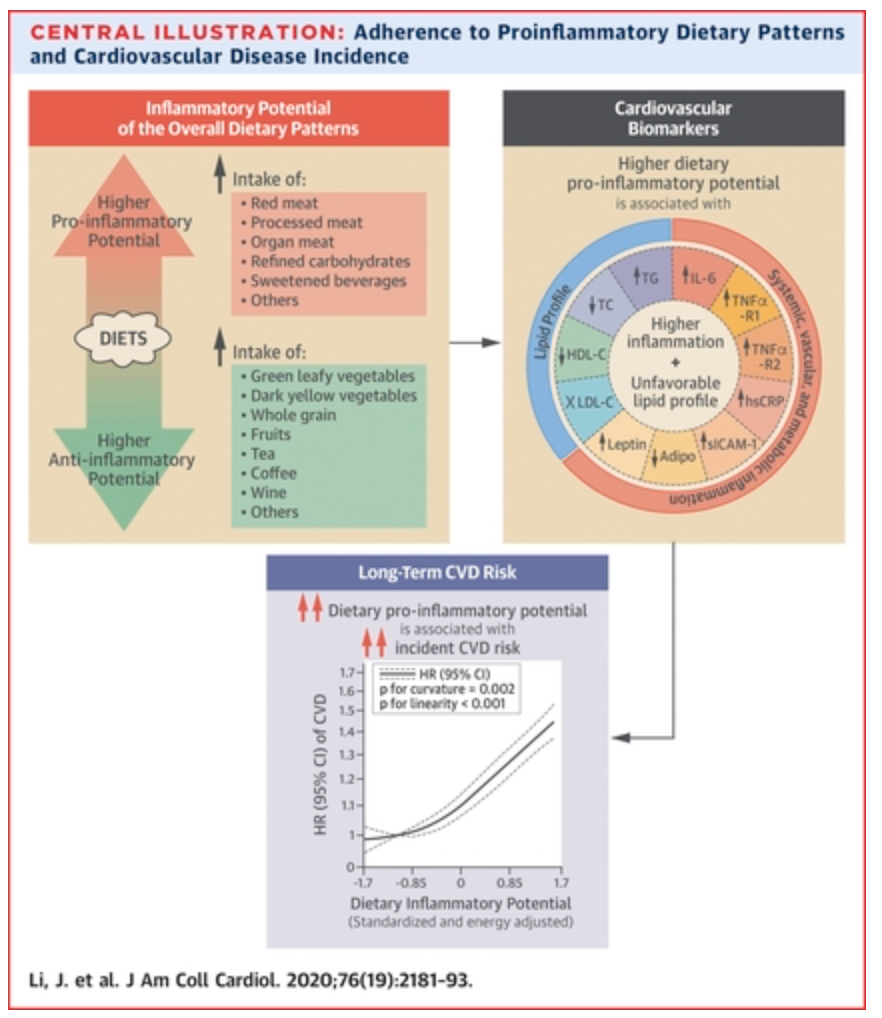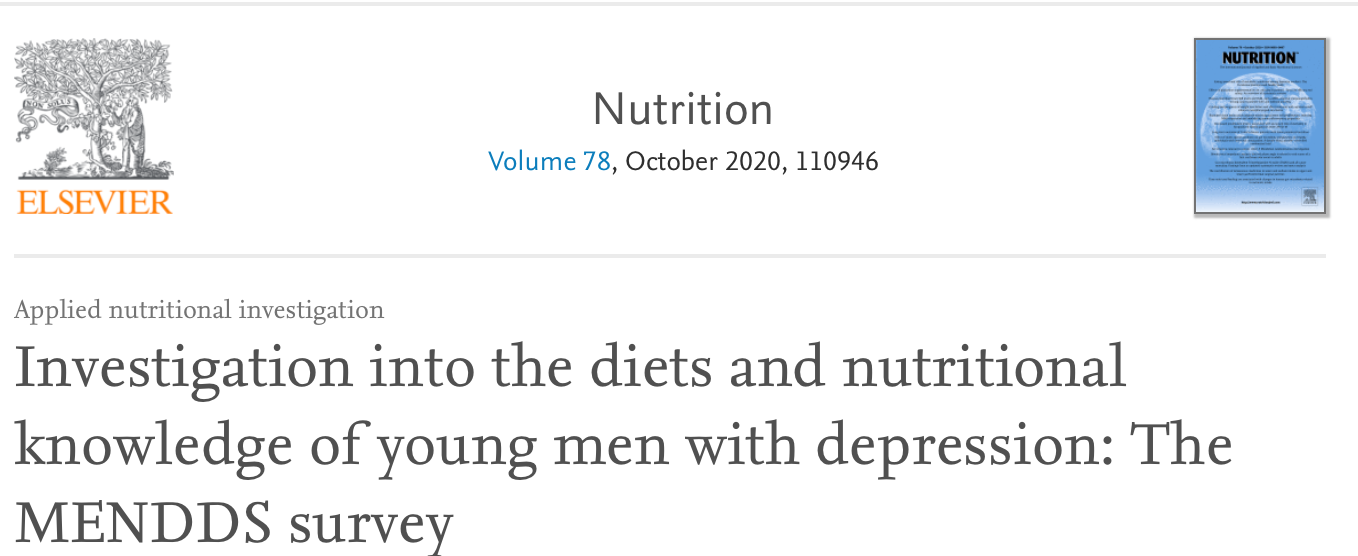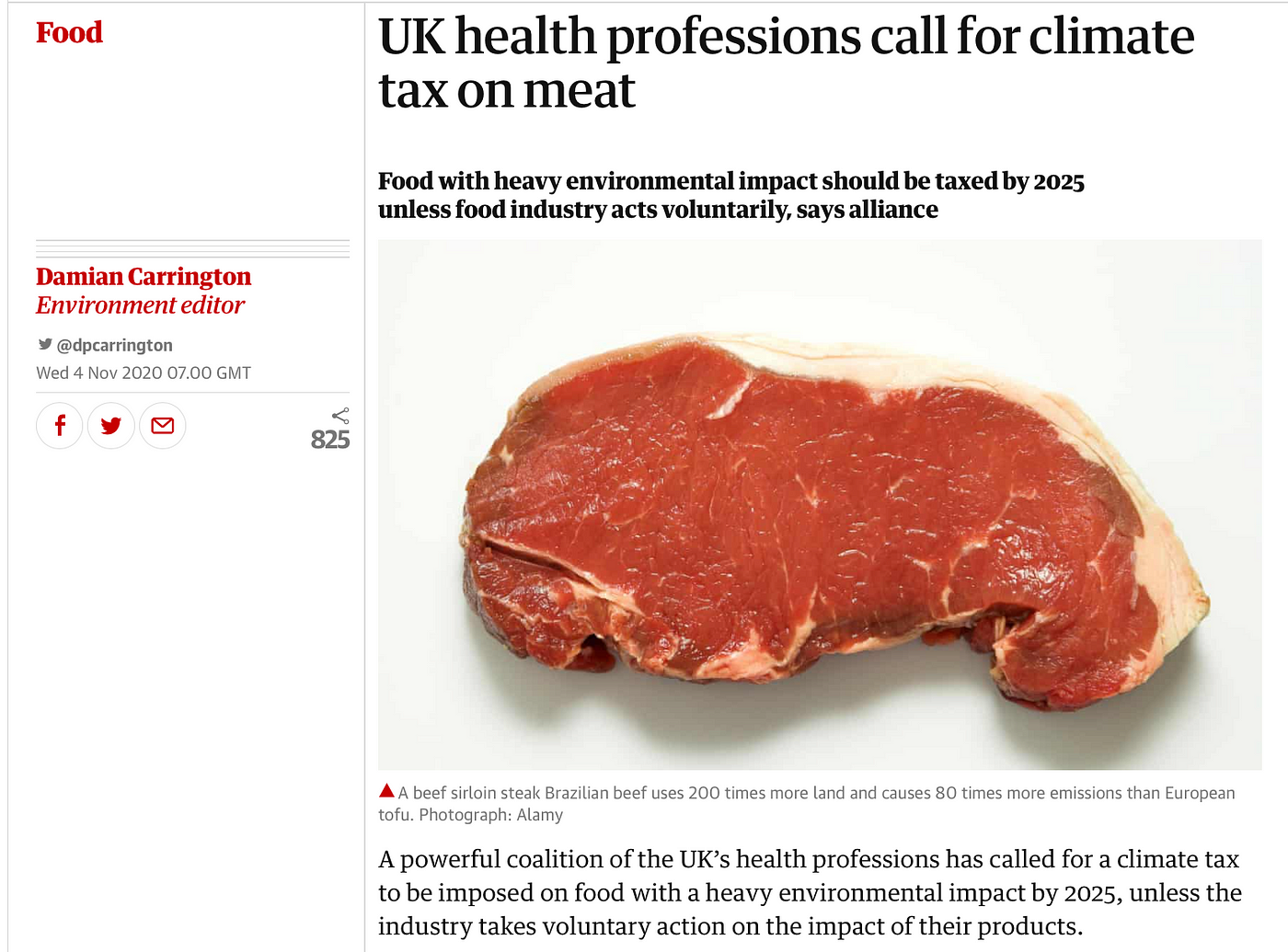Review of the week’s plant-based nutrition news 8th November 2020
This week I highlight mechanisms by which animal foods may increase the risk of chronic disease, the benefits of soya consumption for brain health, the poor quality of diet in people with depression and more concerns that the global food system is preventing us from achieving climate change targets.

DIET, INFLAMMATION AND CARDIOVASCULAR DISEASE (CVD): Inflammation is a key mechanism that drives chronic disease, including CVD. Foods within the diet can either cause inflammation or dampen down inflammation and thus researchers have created a scoring system that analyses dietary components based on their inflammatory potential. Dietary patterns with a high inflammatory potential have been associated with a number of chronic diseases. In general red and processed meat and processed foods all have high inflammatory potential whilst who plant foods are anti-inflammatory.
This study analyses dietary data from the Nurses’ Health Study I and II and the Health Professional Follow-up Study and includes more than 200,000 men and women followed for greater than 30 years. The study investigated the assoication between the empirical dietary inflammatory pattern (EDIP) score and cardiovascular outcomes; myocardial infarction and stroke. The EDIP score has been previously developed by examining the impact of 39 foods on 3 plasma biomarkers of inflammation — interleukin-6, TNFa-R2, and CRP. The current study used 18 of these foods (Processed meat, Red meat, Organ meat, Other fish, Beer, Wine, Tea, Coffee, Fruit juice, Yellow vegetables, Tomatoes, Leafy green vegetables, Other vegetables, Refined grains, Pizza, Snacks, High-energy beverages, Low-energy beverages) and the image below shows how these foods affect inflammation.
The results demonstrated that the higher inflammatory potential of regular dietary patterns was associated with an increased incidence of total CVD, CHD, and stroke in U.S. men and women. Compared with individuals consuming anti-inflammatory diets, those consuming proinflammatory diets had a 38% higher risk of developing CVD after adjustment for risk factors and confounders. A higher dietary inflammatory potential was significantly associated with biomarkers indicating higher systemic, vascular, and metabolic inflammation and an unfavorable lipid profile.
This study highlights a key mechanism by which diet can impact the risk of CVD. Researchers are investigating the use of anti-inflammatory medications to prevent CVD. However, a randomised study of a vegan diet versus the American Heart Association diet has already shown that a vegan diet can significantly lower inflammation and thus may have a therapeutic role in lowering the risk of CVD.


ANTIBODIES AGAINST MEAT AND DAIRY MAY INCREASE THE RISK OF CANCER: There are several mechanims by which food can increase the risk of cancer. This study highlights a potentially novel mechanism related to the consumption of meat and dairy. Neu5GCc (N-Glycolylneuraminic acid) is a sialic acid molecule found in non-human mammals. Humans can not synthesise this sugar/carbohydrate molecule. Exposure to this foreign molecule through the consumption of meat and dairy can lead to inflammation and the production of antibodies against it, contributing to the development of chronic disease. These antibodies have been associated with a higher risk of cancer, especially colorectal cancer (CRC). Worryingly, it has been found that Neu5Gc is expressed by human cancer cells.
There were two parts to this current study. The first part analysed world global data to demonstrate that CRC incidence and mortality are associated with increased national meat consumption. Researchers used national per capita meat intake from the Food and Agriculture Organization of the United Nations, and CRC age-standardized incidence and mortality rates from GLOBOCAN database. There was a positive correlation between CRC incidence and mortality and meat intake. CRC rates were lowest in Sri Lanka, India, and many African nations, while highest in Australia, USA, Europe, and South American nations.
The second part reports data from the NutriNet Sante Cohort, a prospective study from France. Dietary information from 19,621 adult participants was used to calculate the daily Neu5Gc intake. Blood samples were taken from a representative sample of 120 participants and tested for levels of the anti-Neu5Gc antibodies.The results showed that those consuming the most meat and dairy had higher levels of anti-Neu5Gc antibodies with a dose response.
The authors conclude that these data provide a potential link between high meat intake and increased risk of colo-rectal cancer through generation of pathogenic antibodies to Neu5GCc. Further studies are required to prove this hypothesis. Until we find out the true significance of these findings for cancer development, the precautionary principle should prevail and we should avoid foods that create an abnormal immune reaction.

SOYA CONSUMPTION AND BRAIN HEALTH: The consumption of minimally processed soya foods has been associated with a reduced risk of a number of chronic diseases, especially in Asian populations who consume the most soya foods. Some individuals when consuming soya produce a metabolite in the gut from the isoflavone daidzein called equol. Equol production is dependent on having the relevant bacteria present in the gut. There is a difference in ability to produce equol based on race and diet pattern with around 30% of Western populations and up to 60% of Asians and vegetarians having the gut bacteria required to produce equol.
This study investigated the effect of equol production from soya consumption on brain health in 91 elderly Japanese aged 75–89 years. Participants underwent brain magnetic resonance imaging and positron emission tomography to examine the presence of white matter lesions and amyloid-beta deposits, both associated with cognitive decline and dementia. The results were correlated with meaurements of serum equol from stored samples taken 6–9 years prior. 51% of the cohort were equol producers. The results showed that those that produced the most equol had a significantly lower incidence of white matter lesions than those who had lower levels of equol. In fact, 50% more white matter lesions were seen in people who could not produce equol compared to people who could produce it. Equol production did not appear to impact levels of amyloid-beta deposited within the brain, a feature of Alzheimer dementia. High levels of soya isoflavones, daidzein and genistein, had no impact on levels of white matter lesions or amyloid-beta when equol wasn’t produced.
There are so many benefits of consuming minimally processed soya foods and some of the benefits may be enhanced in those that have the ability to produce equol. A recent systematic review and meta-analysis of randomised studies of dietary soya and isolated soya isoflavones showed a benefit for cognitive function in adults. Soya consumption is also excellent for heart health and can be useful in managing menopausal symptoms, particularly in those that produce equol.
The take home message is that soya consumption is a healthy component of any diet pattern and to gain maximum benefit, measures to increase equol production should be adopted, including a carbohydrate rich, plant-based diet pattern.

DIET AND DEPRESSION, AN OPPORTUNITY TO INTERVENE: Mental health disorders such as depression are a rising concern and lifestyle factors can have a huge impact. Healthy diet patterns that emphasise whole plant foods are associated with better mental health and may have a role to play in treatment. This cross-sectional study examined the dietary pattern of 384 Australian men aged 18–25 years with depression. Overall, the diet quality was extremely poor with processed foods such as pizza and fried potatoes eaten 2–3 times per week. Around half never consumed whole grains or legumes. Only 11% of participants reported consuming fruit twice or more per day and 9% consume vegetables twice or more per day. Healthy eating was perceived by most as both time consuming and expensive. Interestingly, 20–35% of participants reported an improvement in symptoms immediately after consuming high fat or high sugar, processed foods but after a few hours they noticed a worsening of symptoms. A third of participants reported an improvement in symptoms after eating fruits and vegetables. The majority reported a negative impact on symptoms after consuming alcohol. Most participants did believe that diet was important for overall and mental health and most reported that they would be willing to change their diet if it would improve their symptoms of depression.
I suspect studies from other Western countries would show similar results in young adults with depression. This provides an opportunity for a positive intervention with the potential to improve quality of life. Mental health disorders share the same underlying pathogenic mechanisms as other common chronic physical diseases, including inflammation, oxidative stress, and gut dysbiosis (altered composition of the gut microbiome). So it is not surprising that dietary factors are important. In addition, diet can affect the level of brain-derived neurotrophic factor (BDNF) and other brain signalling molecules, which are required for the functioning of the hippocampus, the area in the brain where mood is regulated. Fruit and vegetable consumption in particular has been associated with improved mental health. Dietary interventions using a Mediterranean-style diet in people with depression have demonstrated improvement in symptoms in both the SMILES trial and the HELFIMED trial. Another interesting randomised study was a multi-centre work place intervention conducted by the Physicians Committee for Responsible Medicine for the company GIECO in the United States. 292 participants across 10 corporate sites, who were overweight and/or had a history of type 2 diabetes, were randomised to a low fat vegan diet composed of fruits, vegetables, whole grains and legumes or to continue their usual diet for 18 weeks. The intervention group also had weekly support meetings. The results showed a significant improvement in mental health well-being, work productivity and reductions in depression and anxiety scores in those on the vegan diet.
Don’t be fooled by studies that report adverse impacts on mood when meat is excluded in the diet. A systematic review published in 2020 concluded that avoiding meat consumption increased the rates of anxiety, depression and/or self harm behaviours. A rather alarming statement if taken at face value and of course the study led to sensationalised media headlines. However, when you delve into the study you find that it was sponsored by an unrestricted research grant from the Beef Checkoff, through the National Cattlemen’s Beef Association. 16 of the 18 studies included were of cross-sectional design and hence reverse causation cannot be excluded i.e. it cannot take into account what came first — the mental health disorder or removing meat from the diet. The review clearly states that for most studies they did not know which came first. Only 11 studies found a negative impact of meat abstinence of mental health and the only robust study included with a randomised study design actually found a benefit for the vegetarian diet pattern. Diet quality was not examined and we know that the classification of diet as vegetarian or vegan does not give an indication of the healthiness of the food being consumed. Many of the more robust prospective cohort studies and the GIECO study mentioned above were not included in the analysis.

WE HAVE TO CHANGE THE GLOBAL FOOD SYSTEM TO PREVENT GLOBAL WARMING: Another important study warning us that if we continue our ‘business as usual’ diet, high in meat and dairy consumption, we will not be able to meet climate change targets set by the Paris Agreement. The global food system produces around a third of all greenhouse gas emissions (GHG), which includes carbon, methane and nitrous oxide. These emissions continue to increase and the greatest contibution comes from animal agriculture.
This study highlights that reducing GHG emissions from the global food system is essential to meeting the target to keep global warming below 1.5° or 2°C. Even if all GHG emissions from non-food sources were immediately stopped and were net zero from 2020 to 2100, emissions from the food system alone would likely exceed the 1.5°C emissions limit between 2051 and 2063. The study models the impact of 5 strategies including the adoption of a plant-predominant diet (EAT-Lancet planetary health plate), adjusting global per capita caloric consumption to healthy levels, improving crop yields and efficiency of food production and reducing foods waste. If implemented, these strategies could reduce food system GHG emissions up to 50%.
Every week there is a study highlighting the importance of adopting a plant-based diet for climate health, particularly in middle and high incomes countries. The evidence is so strong that this week the UK Health Alliance on Climate Change, a group of medical professional organisations, called upon the Government to tax foods that contribute most to climate destruction i.e. meat and dairy. I approve of the message but taxing consumers is not the best way forward. The UK Government needs to stop supporting and subsidizing animal farming and instead support and subsidise the production of food that is associated with both optimal human and planetary health. A transition to a plant-diet is required now and this needs to be implemented in conjunction with an education campaign for health professionals and the public. In the meantime, we can all take action as consumers because if the demand for meat and dairy vanished, farmers would have to adapt to produce the food that we are choosing to eat. So start today and transition to a plant-based diet.

If you have found this article useful, please follow my organisation ‘plant-based health professionals UK’ on Instagram @plantbasedhealthprofessionals and facebook. You can support our work by joining as a member or making a donation via the website.
